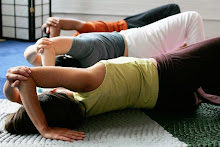 Image via Wikipedia
Image via Wikipedia
I spent the weekend doing the tedious but necessary work of transferring 160 digital products to a new shopping cart, part of the secret life of an e-commerce mogul. That's intended as an ironic statement, since I am a one-person, self-employed show. The project had been on the back burner for months, and an open stretch of time appeared. I hunkered down.
Luckily, there was not much typing. However, there was a lot of "highlight - copy - paste - next." Over and over and over and over. . . let's say, there was a pattern. It took me about two minutes to go through the entire process for each entry. That's a little over five hours on data entry. I spread the tasks over two days, took frequent breaks, and ended up with a fully-functioning and re-designed web site after about 15 hours at the computer. And I realized, once again, that humans are not suited for monotony.
I noticed the physical effects within the hour. My wrists and fingers began to tingle. My thumb began to hurt. Luckily, the only slave-driver boss I had to please was myself, and I'm a Feldenkrais teacher. I set a timer for 30-minute intervals, and made sure to get up and walk around for a few minutes during the breaks. I began to explore different ways that my "mouse wrist" could stay softly bent away from the mouse, rather than resting on the desk or wrist-rest. I also wondered -- am I using more force or power than is necessary? What was the least amount of "impact" needed for my finger to click the mouse, for my wrist and thumb to guide, for my hand to grip? I began to feel the connection of my hand to my whole arm, and to my shoulder, seeing where I could soften, and allowing my pelvis to shift and roll on my chair. I looked for small variations that I could incorporate so that my movements did not become rigid and rote. If I had not had this awareness and movement training, I could easily have gotten myself into some serious and long-term pain. These repetitive motion strain injuries are leaders among workers compensation insurance claims.
During my escapes to do errands, I noticed that I was mentally sluggish. I wandered around the grocery store in more of a daze than usual. I was preoccupied with the task back at the office, thinking of the monotonous pointing and clicking even as I surveyed the artichokes. I wondered -- am I too impaired to drive? I felt the pull back to the office. Must. Complete. Mission. Must. Click. Mouse.
The word "monotony" has the same origins as "monotone," or "one sound." Our nervous systems actually become "tone deaf" when we don't have enough harmonious stimulation, or several melodies to make the day's song interesting. Variety is the spice of life, and it's also what your brain needs to stay vital and engaged.
Those monotonous hours put my brain into a dulled, unresponsive state. As I was preparing for dinner, a big, heavy dish slipped out of a low cabinet and fell onto my toe. Had I broken my toe? This was not the kind of "break" I wanted to take! Now, my focus was even more "mono-toe-nus." After the required expletives, my throbbing toe dominated my senses, my awareness, my self-image. The pain from my toe was the brightest blip on my internal radar, and I felt like my entire body was just one, gigantic, throbbing, possibly broken, toe. Ice, please. More expletives. Elevate. Dinner.
The happy ending is -- the dish is fine. My toe is not broken, just badly bruised. A few aspirin and keeping it elevated has helped a lot. And, the computer task blitz is completed. I look forward to my Feldenkrais classes this week, to bring my self-image and my brain back to a harmonious state, free of monotony -- in every sense!

Photo by Chris Welsh, "MaryBeth's toe."
The website construction that led to my injury is DictionHelper.com . MP3 audio downloads of foreign-language pronunciation for beginning classical vocalists, resources for singers, and podcasts.

![Reblog this post [with Zemanta]](http://img.zemanta.com/reblog_e.png?x-id=c29901a1-99cf-433b-9f23-036d1d9642f0)


No comments:
Post a Comment